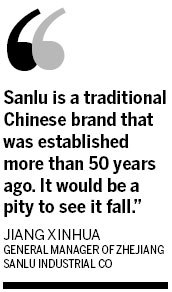
Sanlu, the dairy brand that nearly disappeared from the public eye after its tainted milk killed at least six infants in 2008, has made its way back into the market, this time in Zhejiang province.
The brand, now owned by Zhejiang Sanlu Industrial Co, no longer makes dairy products and instead produces organic products such as buckwheat and corn noodles.
Jiang Xinhua, general manager of Zhejiang Sanlu, said the company hopes to use the traditional Sanlu name to create popularity in its new products.
Sanlu Group, a State-owned dairy products company based in Shijiazhuang, capital of Hebei province was the original owner of the brand. At the time, Sanlu was one of the oldest and more popular brands of infant formula in China.
But in 2008, authorities found that melamine, a chemical that creates kidney stones, was added into infant milk powder to make it seem richer in protein during food safety tests.
The tainted milk powder claimed the lives of six infants and sickened tens of thousands of children. The scandal forced Sanlu Group into bankruptcy.

The "Sanlu" trademark package, including its logos and designs, was auctioned off in May 2009. Jiang bought it for 7.3 million yuan ($1.2 million).
"Sanlu is a traditional Chinese brand that was established more than 50 years ago. It would be a pity to see it fall," Jiang said. "We are using the already famous brand to sell our products."
More than four years after the scandal, Jiang said the company is ready to launch a new Sanlu brand in the high-end organic food market with organic certifications from China, Japan, the European Union and the United States.
"Our market position is totally different from the past, which had focused on rural markets. Organic food represents the high-end food market and we are determined to become the top organic food producer in China," she said.
The company's products are already available in domestic supermarkets such as Shanghai-based Century Mart. Jiang said the company is also approaching multinational supermarkets such as Wal-Mart to discuss cooperative deals.
But skepticism in the brand remains. Analysts say it was a highly risky move to purchase the trademark and then re-use it in the food market.
Zhang Ling at Beijing-based Hejun Consulting said although Zhejiang Sanlu is a different company, the image from 2008 has taken root in customers' minds.
"The Sanlu brand was valuable when the former dairy producer was at its peak, but now, I would say it is worthless," he said.
Before the 2008 milk powder scandal, Sanlu had assets of more than 15 billion yuan, Zhang said.
"The initial image of a brand is very important. The poison milk powder scandal had already damaged the brand image, which will take maybe dozens of years for customers to accept again," he said.
Zhang said it would be extremely costly for Zhejiang Sanlu to create a new customer mindset.
"Most customers won't even be aware that today's Sanlu is a different company because the logo has barely changed," he said.
Jiang admitted the company is not sure how customers will react to the new Sanlu.
"This is our only concern about the future. Our products and management are excellent," Jiang said.
Liang Xiuqin, 58, said even if Sanlu belongs to a new company, she wouldn't risk buying its new products because similar products from other brands exit with better reputations.
"After all, they are not daily necessities," she said.
yanyiqi@chinadaily.com.cn
(China Daily 12/14/2013 page4)